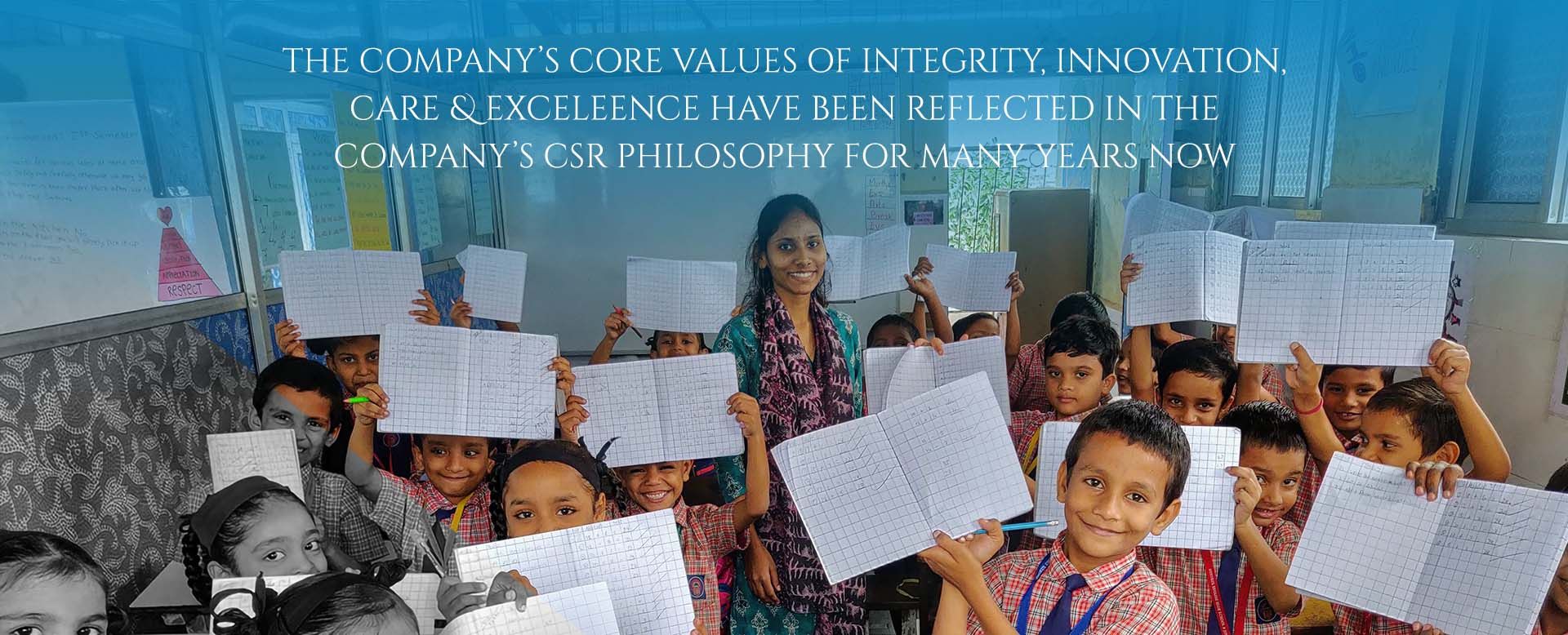Corporate Social Responsibility Policy (CSR Policy)
CSR PHILOSOPHY:
The Jewelex Group has been involved in philanthropy for over 50 years now, even before CSR was mandated by law.
The Company’s CSR Policy is rooted in the core values of Integrity, Innovation, Care and Excellence. Projects and activities carried out in this regard are the subject matter of the Policy.
The Board of Directors and Management believing in an ethos of generosity and compassion, subscribe to the philosophy of compassionate giving.
CSR VISION :
“To contribute to the social and economic development of the communities/ geographies near which we operate, thereby resulting in better & sustainable way of life for the weaker/less privileged sections of society”.
CONSTITUTION OF CSR COMMITTEE:
In line with Section 135 of the Companies Act, 2013 (hereinafter referred to as “the Act”), the Board of Directors of the Company shall form a Corporate Social Responsibility Committee (hereinafter referred to as the “CSR Committee”), to inter alia, carry out following functions:
- To formulate and recommend to the Board, a Corporate Social Responsibility Policy;
- To recommend the amount of expenditure to be incurred on the activities / CSR contributions to various organisations or NGOs, as per the annual CSR Plan.
- To monitor the CSR contributions from time to time.
CSR Committee :
The CSR Committee of the company would comprise of 3 Directors viz. 1) Mr. Nilesh P. Kothari 2) Mr. Anish P. Kothari and 3) Mr. Ashish P. Kothari. The Chairman of the Committee would be Mr. Nilesh P. Kothari.
IMPLEMENTATION PROCESS:
In accordance with the primary CSR philosophy of the Group and the specified activities under the Companies Act, 2013 read with the Companies (Corporate Social Responsibility Policy) Rules, 2014, Companies (CSR Policy) amendment rules, 2021 and any amendment(s) thereof, the CSR contributions of the Company can have the following thrust areas :-
The CSR Manager carries out an informal survey of the current social needs and the NGOs addressing the various social issues. This is then discussed with the CSR Committee and the projects are approved. The CSR Committee can spend CSR funds on any of the following activities, as specified in Schedule VII under Sec. 135 of the Companies Act, 2013 and amendments thereof :
- Promoting Education, including special education and employment enhancing vocation skills for gainful employment of youth & livelihood enhancement projects.
- Promoting Healthcare, including preventive healthcare.
- Eradicating Hunger, poverty and malnutrition.
- Environmental sustainability & ecological balance.
The company believes in meeting with the representatives of the NGOs whose CSR activities will be supported. Subsequently, based on need, the projects are prioritized.
ACTIVITIES, GOVERNANCE & ORGANIZATION :
Activities:
The CSR Manager carries out an informal survey of the current social or community needs and the NGOs addressing these issues. This is then discussed with the CSR Committee and the projects are approved. The CSR Committee can spend CSR funds on any of the following activities, as specified in Schedule VII under Sec. 135 of the Companies Act, 2013 and amendments thereof :
- Eradicating hunger, poverty and malnutrition, promoting health care including preventive health care and sanitation including contribution to the Swach Bharat Kosh set-up by the Central Government for the promotion of sanitation and making available safe drinking water.
- Promoting education, including special education and employment enhancing vocation skills especially among children, women, elderly and the differently abled and livelihood enhancement projects.
- Promoting gender equality, empowering women, setting up homes and hostels for women and orphans; setting up old age homes, day care centres and such other facilities for senior citizens and measures for reducing inequalities faced by socially and economically backward groups.
- Ensuring environmental sustainability, ecological balance, protection of flora and fauna, animal welfare, agroforestry, conservation of natural resources and maintaining quality of soil, air and water [including contribution to the Clean Ganga Fund]
- Protection of national heritage, art and culture including restoration of buildings and sites of historical importance and works of art; setting up public libraries; promotion and development of traditional art and handicrafts;
- Measures for the benefit of armed forces veterans, war widows and their dependents, Central Armed Police Forces (CAPF) and Central Para Military Forces (CPMF) veterans, and their dependents including widows
- Training to promote rural sports, nationally recognised sports, paralympic sports and Olympic sports
- Contribution to the prime minister’s national relief fund or Prime Minister’s Citizen Assistance and Relief in Emergency Situations Fund (PM CARES Fund)] or any other fund set up by the central govt. for socio economic development and relief and welfare of the schedule caste, tribes, other backward classes, minorities and women;
-
(a) Contribution to incubators or research and development projects in the field of
science, technology, engineering and medicine, funded by the Central Government or
State Government or Public Sector Undertaking or any agency of the Central
Government or State Government; and
(b) Contributions to public funded Universities; Indian Institute of Technology (IITs); National Laboratories and autonomous bodies established under Department of Atomic Energy (DAE); Department of Biotechnology (DBT); Department of Science and Technology (DST); Department of Pharmaceuticals; Ministry of Ayurveda, Yoga and Naturopathy, Unani, Siddha and Homoeopathy (AYUSH); Ministry of Electronics and Information Technology and other bodies, namely Defense Research and Development Organization (DRDO); Indian Council of Agricultural Research (ICAR); Indian Council of Medical Research (ICMR) and Council of Scientific and Industrial Research (CSIR), engaged in conducting research in science, technology, engineering and medicine aimed at promoting Sustainable Development Goals (SDGs).] - Rural development projects
- Slum area development.
- Disaster management, including relief, rehabilitation and reconstruction activities.
Governance:
- Every year, the CSR Committee will place for the Board’s approval, a CSR Plan detailing some of the CSR activities to be supported during the financial year and an overall budget. The Board will consider and approve the CSR Plan with any modifications that may be deemed necessary.
- The CSR Committee shall review the implementation of CSR Plan with the relevant NGOs, to ensure efficient execution of the CSR Plan in accordance with this policy.
Reporting : The CSR initiatives supported would be reported in the Board of Directors Report (Annual Report) & FORM CSR-2 on the MCA portal.
Organization:
The Company has a CSR Manager who reports to the Board of Directors, to ensure the successful and time bound implementation of the CSR Plan.
EXPENDITURE & SURPLUS OF CSR PROJECTS:
The CSR expenditure will include all expenditure, direct and indirect, incurred or supported by the Company on the CSR activities undertaken in accordance with approved CSR plan.The CSR funds would comprise of minimum 2% of the preceding 3 years’ average Net Profit before Tax and include any income arising therefrom or adjusted from previous years’ excess contributions, as requisite.
JEWELEX REMAINS FIRMLY COMMITTED TO ITS PHILOSOPHY OF CONTRIBUTING TO CSR ACTIVITIES YEAR AFTER YEAR.



